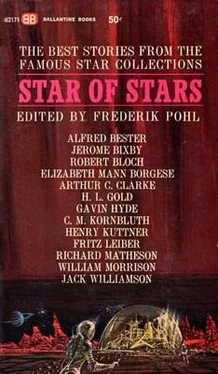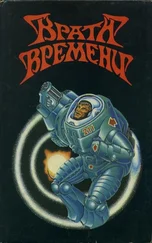JEROME BIXBY
It's a Good Life
Aunt Amy was out on the front porch, rocking back and forth in the high-backed chair and fanning herself, when Bill Soames rode his bicycle up the road and stopped in front of the house.
Perspiring under the afternoon “sun,” Bill lifted the box of groceries out of the big basket over the front wheel of the bike and came up the front walk.
Little Anthony was sitting on the lawn, playing with a rat. He had caught the rat down in the basement—he had made it think that it smelled cheese, the most rich-smelling and crumbly-delicious cheese a rat had ever thought it smelled, and it had come out of its hole, and now Anthony had hold of it with his mind and was making it do tricks.
When the rat saw Bill Soames coming, it tried to run, but Anthony thought at it, and it turned a flip-flop on the grass and lay trembling, its eyes gleaming in small black terror.
Bill Soames hurried past Anthony and reached the front steps, mumbling. He always mumbled when he came to the Fremont house, or passed by it, or even thought of it. Everybody did. They thought about silly things, things that didn’t mean very much, like two-and-two-is-four-and-twice-is-eight and so on; they tried to jumble up their thoughts and keep them skipping back and forth, so Anthony couldn’t read their minds. The mumbling helped. Because if Anthony got anything strong out of your thoughts, he might take a notion to do something about it—like curing your wife’s sick headaches or your kid’s mumps, or getting your old milk cow back on schedule, or fixing the privy. And while Anthony mightn’t actually mean any harm, he couldn’t be expected to have much notion of what was the right thing to do in such cases.
That was if he liked you. He might try to help you, in his way. And that could be pretty horrible.
If he didn’t like you—well, that could be worse.
Bill Soames set the box of groceries on the porch railing and stopped his mumbling long enough to say, “Everythin’ you wanted, Miss Amy.”
“Oh, fine, William,” Amy Fremont said lightly. “My, ain’t it terrible hot today?”
Bill Soames almost cringed. His eyes pleaded with her. He shook his head violently no, and then interrupted his mumbling again, though obviously he didn’t want to. “Oh, don’t say that, Miss Amy. It’s fine, just fine. A real good day!”
Amy Fremont got up from the rocking chair and came across the porch. She was a tall woman, thin, a smiling vacancy in her eyes. About a year ago Anthony had got mad at her, because she’d told him he shouldn’t have turned the cat into a cat rug, and although he had always obeyed her more than anyone else, which was hardly at all, this time he’d snapped at her. With his mind. And that had been the end of Amy Fremont’s bright eyes, and the end of Amy Fremont as everyone had known her. And that was when word got around in Peaksville (population forty-six) that even the members of Anthony’s own family weren’t safe. After that, everyone was twice as careful.
Someday Anthony might undo what he’d done to Aunt Amy. Anthony’s Mom and Pop hoped he would. When he was older, and maybe sorry. If it was possible, that is. Because Aunt Amy had changed a lot, and besides, now Anthony wouldn’t obey anyone.
“Land alive, William,” Aunt Amy said, “you don’t have to mumble like that. Anthony wouldn’t hurt you. My goodness, Anthony likes you!” She raised her voice and called to Anthony, who had tired of the rat and was making it eat itself, “Don’t you, dear? Don’t you like Mr. Soames?”
Anthony looked across the lawn at the grocery man—a bright, wet, purple gaze. He didn’t say anything. Bill Soames tried to smile at him. After a second Anthony returned his attention to the rat. It had already devoured its tail, or at least chewed it off—for Anthony had made it bite faster than it could swallow, and little pink and red furry pieces lay around it on the green grass. Now the rat was having trouble reaching its hindquarters.
Mumbling silently, thinking of nothing in particular as hard as he could, Bill Soames went stiff-legged down the walk, mounted his bicycle and pedaled off.
“We’lI see you tonight, William,” Aunt Amy called after him. As Bill Soames pumped the pedals, he was wishing deep down that he could pump twice as fast, to get away from Anthony all the faster, and away from Aunt Amy, who sometimes just forgot how careful you had to be. And he shouldn’t have thought that. Because Anthony caught it. He caught the desire to get away from the Fremont house as if it was something bad, and his purple gaze blinked, and he snapped a small, sulky thought after Bill Soames—just a small one, because he was in a good mood today, and besides, he liked Bill Soames, or at least didn’t dislike him, at least today. Bill Soames wanted to go away—so, petulantly, Anthony helped him.
Pedaling with superhuman speed—or, rather, appearing to, because in reality the bicycle was pedaling him—Bill Soames vanished down the road in a cloud of dust, his thin, terrified wail drifting back across the summerlike heat.
Anthony looked at the rat. It had devoured half its belly, and had died from pain. He thought it into a grave out deep in the cornfield—his father had once said, smiling, that he might as well do that with the things he killed—and went around the house, casting his odd shadow in the hot, brassy light from above.
In the kitchen, Aunt Amy was unpacking the groceries. She put the Mason-jarred goods on the shelves, and the meat and milk in the icebox, and the beet sugar and coarse flour in big cans under the sink. She put the cardboard box in the corner, by the door, for Mr. Soames to pick up next time he came. It was stained and battered and torn and worn fuzzy, but it was one of the few left in Peaksville. In faded red letters it said “Campbell’s Soup.” The last cans of soup, or of anything else, had been eaten long ago, except for a small communal hoard which the villagers dipped into for special occasions—but the box lingered on, like a coffin, and when it and the other boxes were gone the men would have to make some out of wood.
Aunt Amy went out in back, where Anthony’s Mom—Aunt Amy’s sister—sat in the shade of the house, shelling peas. The peas, every time Mom ran a finger along a pod, went lollop-lollop-lollop into the pan on her lap.
“William brought the groceries,” Aunt Amy said. She sat down wearily in the straight-backed chair beside Mom and began fanning herself again. She wasn’t really old; but ever since Anthony had snapped at her with his mind, something had seemed to be wrong with her body as well as her mind, and she was tired all the time.
“Oh, good,” said Mom. Lollop went the fat peas into the pan.
Everybody in Peaksvile always said, “Oh, fine,” or “Good,” or “Say, that’s swell!” when almost. anything happened or was mentioned—even unhappy things like accidents or even deaths. They’d always say “Good” because if they didn’t try to cover up how they really felt Anthony might overhear with his mind, and then nobody knew what might happen. Like the time Mrs. Kent’s husband, Sam, had come walking back from the graveyard because Anthony liked Mrs. Kent and had heard her mourning.
Lollop.
“Tonight’s television night,” said Aunt Amy. “I’m glad. I look forward to it so much every week. I wonder what we’ll see tonight.”
“Did Bill bring the meat?” asked Mom.
“Yes.” Aunt Amy fanned herself, looking up at the featureless brassy glare of the sky. “Goodness, it’s so hot! I wish Anthony would make it just a little cooler—”
“Amy!”
Читать дальше


![Джером Биксби - Забытые имена [антология]](/books/26262/dzherom-biksbi-zabytye-imena-antologiya-thumb.webp)
![Джером Биксби - На суше и на море [1970]](/books/26417/dzherom-biksbi-na-sushe-i-na-more-1970-thumb.webp)


![Джером Биксби - Врата времени [Сборник англо-американской фантастики]](/books/419866/dzherom-biksbi-vrata-vremeni-sbornik-anglo-thumb.webp)
